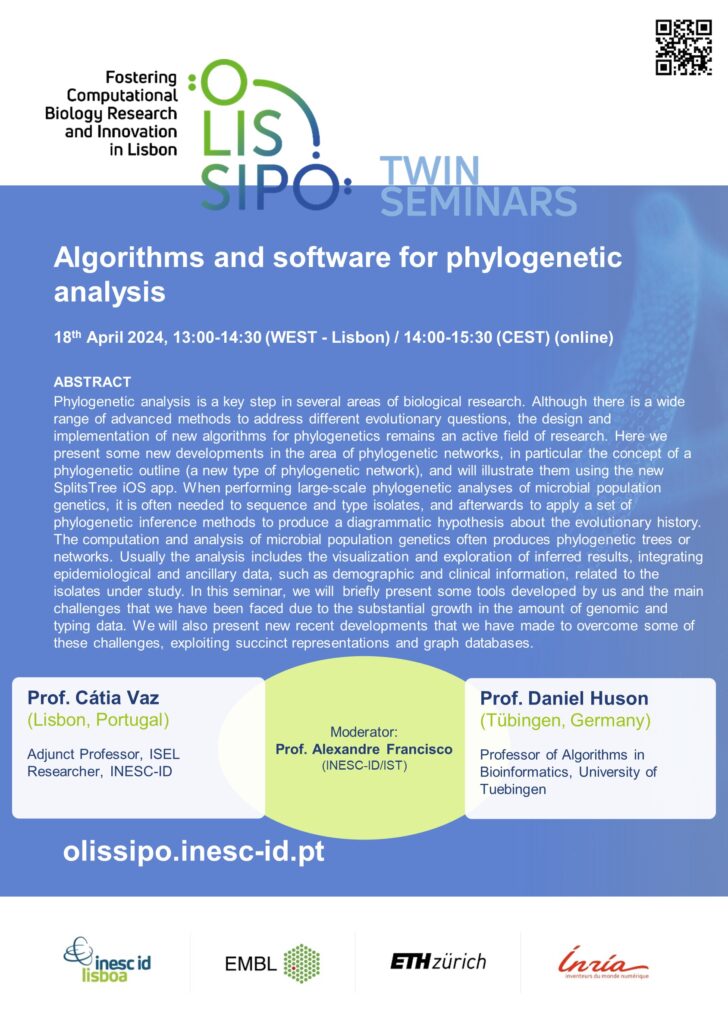
4th OLISSIPO Twin Seminar: “Algorithms and software for phylogenetic analysis” with Cátia Vaz (ISEL) & Daniel Huson (TU)
On April 18, the OLISSIPO project will host its 4th Twin Seminar titled “Algorithms and software for phylogenetic analysis”, presented by Cátia Vaz from ISEL / INESC-ID, and Daniel Huson from University of Tübingen.
The Olissipo Twin Seminars contribute to disseminate the scientific work and expertise of INESC-ID and all the Consortium that includes Inria, ETH Zürich and EMBL. These seminars comprise two short presentations, one researcher from Lisbon and one from a twin international institution working on similar topics in Computational Biology. The seminars are open to everyone interested and will include a discussion to further promote the interaction between all the participants.
Date & Time: April 18, 13h00-14h30
Where: Online via zoom here
Summary: “Phylogenetic analysis is a key step in several areas of biological research. Although there is a wide range of advanced methods to address different evolutionary questions, the design and implementation of new algorithms for phylogenetics remains an active field of research. Here we present some new developments in the area of phylogenetic networks, in particular the concept of a phylogenetic outline (a new type of phylogenetic network), and will illustrate them using the new —SplitsTree iOS app.
When performing large-scale phylogenetic analyses of microbial population genetics, it is often needed to sequence and type isolates, and afterwards to apply a set of phylogenetic inference methods to produce a diagrammatic hypothesis about the evolutionary history. The computation and analysis of microbial population genetics often produces phylogenetic trees or networks. Usually the analysis includes the visualization and exploration of inferred results, integrating epidemiological and ancillary data, such as demographic and clinical information, related to the isolates under study.
In this seminar, we will briefly present some tools developed by us and the main challenges that we have been faced due to the substantial growth in the amount of genomic and typing data. We will also present new recent developments that we have made to overcome some of these challenges, exploiting succinct representations and graph databases.”
Bios:
Cátia Vaz, ESEL and INESC-ID (Portugal)
Cátia Vaz completed her PhD in Computer Science and Engineering in 2010, her MSc in Applied Mathematics in 2004, and her Degree in Applied Mathematics and Computation in 2002, at Instituto Superior Técnico. She has been an Adjunct Professor at the Instituto Superior de Engenharia de Lisboa since 2010, where she is responsible for and/or teaching curricular units focusing on the design, analysis and implementation of algorithms and data structures, in particular in bioinformatics. She is also a researcher at the Institute of Systems and Computer Engineering – Research and Development in Lisbon (INESC-ID Lisbon), participating in several national and international projects, and developing its work in the areas of algorithm engineering, mathematical modeling, computational science, and data science, with applications in computational biology and bioinformatics.
Daniel Huson, University of Tuebingen (Germany)
Daniel Huson studied mathematics at Bielefeld University, obtaining a PhD in 1990 and a Habilitation in 1997, working with Andreas Dress. He was a postdoc in bioinformatics with Tandy Warnow at Princeton University 1997-99, before joining Gene Myer’s group at Celera Genomics to work on the assembly of the human genome. He has been a professor of Algorithms in Bioinformatics at the University of Tuebingen since 2002 and was a visiting professor at NTU and then NUS in Singapore 2011-20. His main field of research is the design and implementation of algorithms in bioinformatics.




